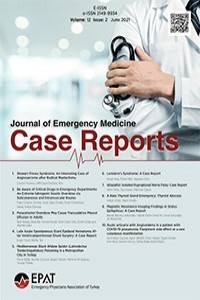Amiyotrofik Lateral Sklerozlu Bir Hastada Status Epileptikus
Amiyotrofik lateral skleroz, status epileptikus
Status Epilepticus in a Patient with Amyotrophic Lateral Sclerosis
Amyotrophic lateral sclerosis, status epilepticus,
___
- Chio A, Mora G, Calvo A, Mazzini L, Bottacchi E, Mutani R, et al. Epide- miology of ALS in Italy: A 10-year prospective population-based study. Neurology 2009; 72: 725-31. [CrossRef]
- Pagnini F, Banfi P, Lunetta C, Rossi G, Castelnuovo G, Marconi A, et al. Re- spiratory function of people with amyotrophic lateral sclerosis and care- giver distress level: A correlational study. Biopsychosoc Med 2012; 6: 14. [CrossRef]
- Rona S, Rosenow F, Arnold S, Carreño M, Diehl B, Ebner A, et al. A semio- logical classification of status epilepticus. Epileptic Disord 2005; 7: 5-12.
- DeLorenzo RJ. Epidemiology and clinical presentation of status epilep- ticus. Adv Neurol 2006; 97: 199-215.
- Hauser WA. Status epilepticus: frequency, etiology, and neurological sequelae. Adv Neurol 1983; 34: 3-14.
- Meldrum BS. Glutamate as a neurotransmitter in the brain: Review of physiology and pathology. J Nutr 2000; 130: 1007-15.
- Bos WM. In search for peripheral markers for epilepsy and ALS - focus on glutamatergic signaling in blood cells. Willemina Minke Bos 2005.
- Delorenzo RJ, Pellock JM, Towne AR, Boggs JG. Epidemiology of status epilepticus. J Clin Neurophysiol 1995; 12: 316-25. [CrossRef]
- Kim JE, Kim DS, Kwak SE, Choi HC, Song HK, Choi SY, et al. Anti-glutama- tergic effect of riluzole: Comparison with valproic acid. Neuroscience 2007; 147: 136-45. [CrossRef]
- Nguyen TT, Hussain E, Grimason M, Goldstein J, Wainwright MS. Neurogen- ic pulmonary edema and acute respiratory distress syndrome in a healthy child with febrile status epilepticus. J Child Neurol 2012; 10: 1287-91.
- Rosenow F, Arzimanoglu A, Baulac M. Recent developments in treat- ment of status epilepticus: A review. Epileptic Disorder 2002; 4: 41-51.
- Yayın Aralığı: 4
- Başlangıç: 2010
- Yayıncı: Alpay Azap
Allerjik Reaksiyon Sonrası Gelişen ST Elevasyonu Olmayan Kalp Krizi: Tip II Kounis Sendromu
Ahmet Oğuz BAKTIR, Bahadır ŞARLI, Hayrettin SAĞLAM, Hüseyin ARINÇ, Mustafa Oğuz CUMAOĞLU, Yasemin DOĞAN
Kardiyak Aritminin Eşlik Ettiği Hipokalemik Periyodik Paralizi Olgusu
Yusuf Kenan TEKİN, Gülaçan TEKİN
Tüberküloza İkincil Addison Hastalığı
Ali DUR, Başar CANDER, Ferudun KOYUNCU, Cemil CİVELEK, Ertan SÖNMEZ, Bedia GÜLEN
Okült Hidronefrozda Basit Bir Futbol İnjurisine Bağlı Renal Pelvis Rüptürü: Olgu Sunumu
Necdet POYRAZ, Abdussamet BATUR, Mehmet BALASAR
Amiyotrofik Lateral Sklerozlu Bir Hastada Status Epileptikus
Ersel DAĞ, Oruç ŞAHİN, Burcu GÖKÇE, Ali Kemal ERDEMOĞLU
Sodyum Kanal Blokeri ile Ortaya Çıkarılan Brugada Sendromu
Şerafettin DEMİR, Mücahit TÜFENK, Vedat Davutoğlu, Mehmet Kanadaşı, Zeynep KARAKAYA
Diz Travmasının Geç Komplikasyonu: İzole Ana Peroneal Sinir Arazı
Mehmet ERDİL, Hasan Hüseyin CEYLAN, Mehmet ELMADAĞ, Kerem BİLSEL, İbrahim TUNCAY
Gebelikte Elektriksel Kardiyoversiyon: Nasıl Yapalım?
Süleyman ERCAN, Vedat DAVUTOĞLU, İbrahim SARI, Suat ZENGİN, Hasan BÜYÜKASLAN
Arı Sokması Sonucu Anaflaksi ve Akut Atrial Fibrilasyon: Olgu Sunumu
Ali KARAKUŞ, A. Burak AKÇAY, M. Murat ÇELİK, Seçil ARICA, Veyis TAŞIN, Koca ÇALIŞKAN
